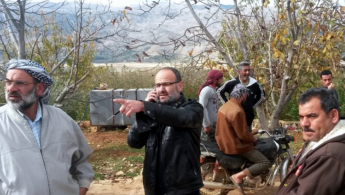Syrian refugees spell double trouble for Lebanese village
In the mountainous southern Bekaa valley, the mayor of the small village of Qaroun has taken it upon himself to control the influx of Syrian refugees.
Yehia Daher, an energetic 40-something with a leather jacket and a short beard, speaks proudly of the measures he has taken - without government help - to prevent his small village of 5,000 being overwhelmed by the demands of its population of 5,000 refugees.
His project involves the close monitoring and control: Each refugee is registered by computer and have their activities monitored.
"I've decided to give shelter to 5,000 refugees; any more than that would not be feasible," says the mayor from an "operations room" where members of the Muslim Scouts manage refugee logistics. "We know exactly where the 5,000 Syrians are."
| We know exactly where the 5,000 Syrians are. Yehia Daher, mayor. |
Ibrahim, a 24-year-old scout leader, turns to a computer displaying data on each refugee: Names, ages, location and even a mobile number, if they have one. "If someone wants to move to a different place, they have to let us know," he says.
About 40 chairs are laid out for the Syrians, who come every Saturday to have their details checked and to receive aid.
While such measures may seem controlling to an outsider, that is exactly what the Lebanese demand. This country of four million is grappling daily with how best to deal with more than 1.5 million Syrian refugees.
Everything is controlled. The aid the town receives is stored in a hangar. On one inventory, the logos of the British NGO Oxfam and the US government's USAID appear next to those of the international Muslim NGO, Islamic Relief, in addition to local organisations like Dar al-Fatwa, the highest Sunni religious body in Lebanon, or Salam, which specialises in medical care.
The UN is also present with its High Commissioner for Refugees (UNHCR), and the the World Food Programme.
The town hosts about 60 tents in each of its two main camps. "We wanted to avoid putting everyone in the same place," says the mayor, in the hope of avoiding the creation of a permanent shanty town. "The land is on loan from landlords. They set one condition: There should be no permanent buildings."
And so the shelters are often blue UNHCR tarpaulins propped up with boards. In one shelter, a refugee family keeps warm with a small cast-iron stove while watching television.
In a corner, a man sleeps with clenched fists, despite the noise. "My husband works nights," says the man's wife, 30-year-old Sana.
People in Qaraoun are used to Syrian workers. As in the rest of Lebanon, they work in agriculture, construction or in shops. The influx of refugees has brought down salaries, and single rooms now cost $200-300 a month. But it is not all bad news.
NGOs have created jobs, and Ibrahim, the scout leader, has been employed by an Italian organisation. The refugees spend food vouchers provided by the UNHCR in small supermarkets. "One of them admitted he'd gone from $5,000 to $30,000 monthly profit," says the mayor.
| Syrians must respect a 9pm curfew, with the exception of men accompanied by their family. |
Schooling is a problem. Some of the refugee children attend the town's two local primary schools: 150 in the morning, and the same number of Lebanese pupils. According to the UNHCR, 348,000 Syrian children in Lebanon have dropped out of school.
"It's forbidden to have more Syrian students than Lebanese ones," the mayor says.
The mayor is also worried about security. The refugees must respect a 9pm curfew, "with the exception of men accompanied by their family". However the monitoring does not stop there. "We open our files to the security forces and they make regular checks on the houses."
A transient life
The mayor is adamant the refugee presence is temporary. "They'll leave one day," he says. The only trace they will leave, he says, are a number of breeze-block buildings a few kilometres from Qaraoun, where about forty Syrian families are sheltered in rudimentary breeze-block lodgings.
"These buildings will be used by the Muslim Scouts. We will also build sports fields," says the mayor.
So why build these houses in such an isolated place, at the end of a mountain trail that has to be climbed by 4x4s? The mayor has a plan: to benefit from international aid to develop the terrain and attract investors.
Nearby, a villa that is nearly finished stands on a rock. "I don't know why it was abandoned," Daher said. He mumbled that the owner probably belonged to Hezbollah, the Shia party. All of the villages that can be seen from the top of the hill are Shia.
A version of this article was first published by our partner website, Orient XXI.



